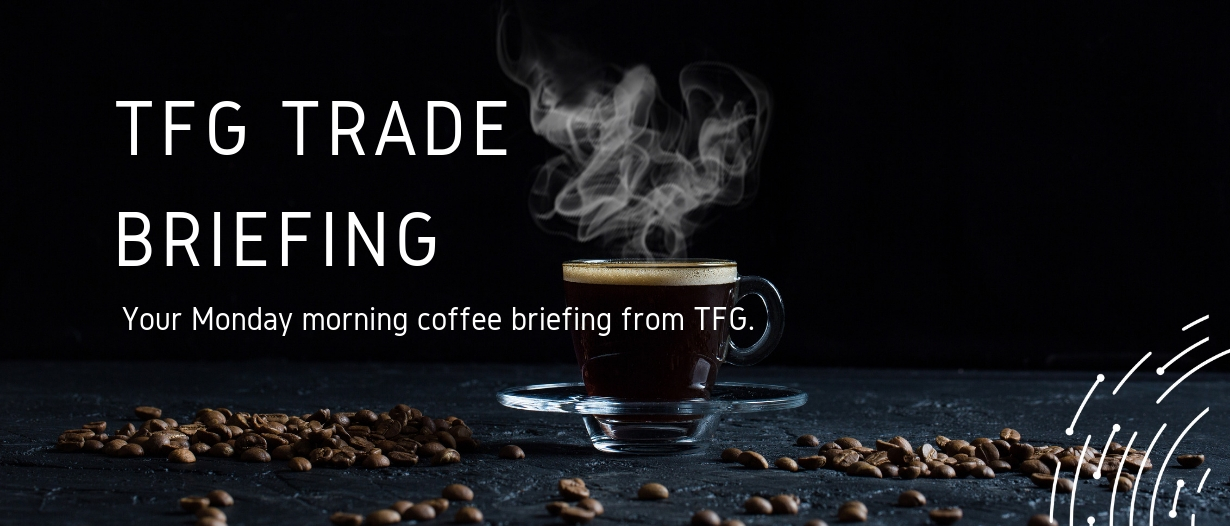Your morning coffee briefing from TFG. Here are some of the last week’s updates from the trade sector. The UK Government has announced plans to invest £1bn in the UK’s electric car industry. The FTSE 100 saw its worst day since January 2016, with around £60bn wiped off stocks. Chinese officials are offering to increase purchases of US agricultural products as they seek an interim agreement. Small and medium-sized enterprises (SMEs) in Ukraine will benefit from a new financing program of 120 million euros.
What happened last week?
Car industry to get £1bn boost as electric drive shifts gear
The Government has announced plans to invest £1bn in the UK’s electric car industry to accelerate the shift towards electric vehicles and reduce carbon emissions. Officials said it will be used to support research and development, as well as “major investments in the manufacturing of batteries, electric motors, drives, power electronics and hydrogen fuel cells”. The Government is also allocating £200m for the first phase of a drive to achieve nuclear fusion, which would create an inexhaustible form of energy without radioactive waste or carbon emissions. the US on the same profits that the Commission claims should have been given to Ireland. Read more →
IFS in no-deal debt warning
The Institute for Fiscal Studies (IFS) has warned that the UK’s national debt would hit its highest level since the mid-1960s if Britain leaves the EU without a deal.
The report also warned that Boris Johnson’s proposed public spending would see the Chancellor overshooting the Government’s borrowing limit by £5bn in 2020/21 – leaving tax cuts pledged by the Prime Minister unaffordable. Read more →
FTSE sees worst day since January 2016
The FTSE 100 saw its worst day since January 2016, with around £60bn wiped off stocks. This came as Brexit fears, poor economic data and concern over a global recession hit shares across the world.
Factors contributing to the dip included Prime Minister Boris Johnson telling MPs that if Brussels does not accept his version of a Brexit deal, the alternative will be a no-deal Brexit, while poor performance on a measure of US manufacturing also contributed. The FTSE 100 closed 2.3% lower, the Stoxx 600 European index, which includes stocks from 17 countries, fell 2.7%, while in the US the Dow, Nasdaq and S&P were all nearly 2% lower. Read more →
China open to ‘partial trade deal’ with US, as tensions rise
Chinese officials are offering to increase purchases of US agricultural products as they seek an interim agreement between Beijing and Washington that will stave off a new round of tariff hikes on October 15, according to people briefed on the two countries’ ongoing negotiations. Read more →
Afreximbank will increase trade financing in Uganda
Now that the Afreximbank is opening a regional branch in Uganda, it is a huge achievement for the bank and Uganda because there is going to be increased access to trade finance here for private companies to facilitate their activities, buy more and sell more products for exports. So, Uganda should strengthen its trade such that it can trade more with its neighbours in the East African region, the rest of Africa and the world. Read more →
EU, EBRD to finance SMEs in Ukraine
Small and medium-sized enterprises (SMEs) in Ukraine will benefit from a new financing program of 120 million euros (132 million U.S. dollars) organized by the European Union (EU), the European Bank for Reconstruction and Development (EBRD), and its partner banks,
The program will receive a financial grant from EU under EU4Business initiative, which aims to improve Ukrainian SME’s access to finance and business knowledge through its advisory services, financing and training.
Pound would see Brexit deal boost
A Reuters survey of economists suggests that the pound will experience a post-Brexit bounce if the UK leaves the EU with a deal, but will see further losses against the dollar if no deal is secured. The forecast suggests that sterling would rally if the UK and EU agree on a deal and trade between $1.27 and $1.34, but could dip to between $1.10 and $1.19 in a no-deal scenario. Shaun Osborne at Scotiabank said: “A lot of bad news is priced into the pound so we would expect a relief rally to some extent if a deal is reached.” Read more →






























